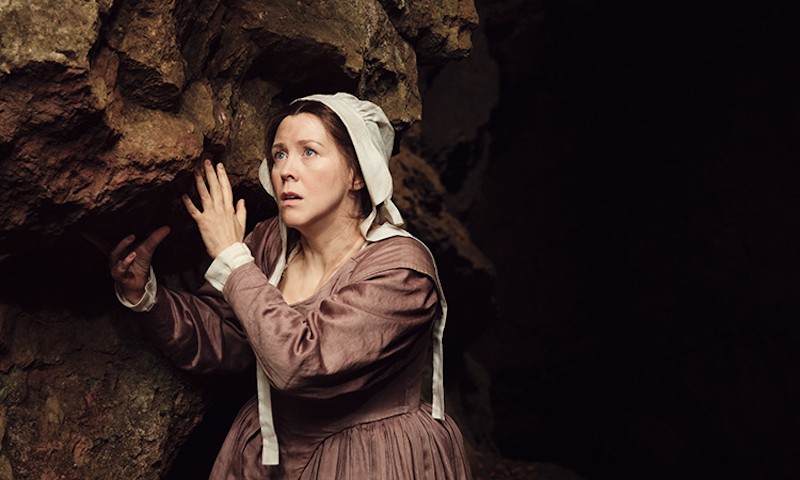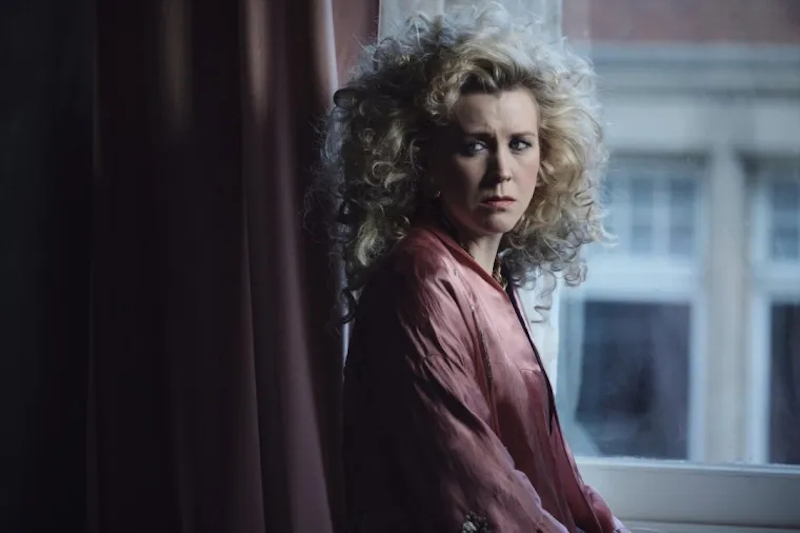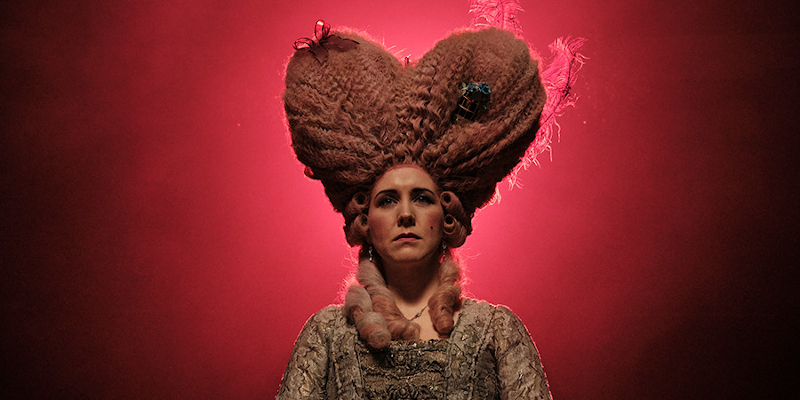Director – Alice Lowe – 2024 – UK – Cert. 15 – 90m
*****
A reincarnated woman falls for the same man in different, historical time periods – hilarious romantic comedy of errors is out in UK cinemas on Friday, October 11th
Agnes (Alice Lowe) is a woman falling madly in love. Sadly, the object of her affection Alex (Aneurin Barnard from Dunkirk, Christopher Nolan, 2017) isn’t really interested. And her attempts at forming relationships seem to always end badly. Although not in the way you might expect – for instance, with her head being lopped off. Yet all is not lost: in the world of the Karmic cycle: you die one day only to be reborn in another time the next. However, Agnes seems destined to make the same mistakes over and over again, consistently falling for Alex the wrong man in each of her different lives at different times in history.
The whole thing plays out like a series of repeated cycles by the same characters in different generations. In that sense, it’s not entirely unlike The Beast (Bertrand Bonello, 2023), a serious art house science fiction costume drama mashup. Timestalker isn’t necessarily in the same league as that film, but then again, The Beast isn’t a comedy and Timestalker is really, really funny. (At least, it was to this critic – although humour is a funny thing, so I have no idea whether the film will prove as humourous for everyone else.)

Some of the cycles don’t really work, because either there’s so little footage here that you can’t get a handle on them (perhaps they got lost as the film was cut down to an admirable 90-minute running length) or they lack clear focus. A prehistory segment involving Agnes as a cavewoman is so brief that I only realised that was what it was when leafing through the press notes. And a futuristic segment is so shoddily made that I didn’t realise its riot police weren’t supposed to be in the present day (again, I only realised that was what it was supposed to be when working through the press notes.).
And yet, despite such missteps, I give the film five stars. (Weirdly, and strangely appropriately for a film in which reincarnation plays such a strong part, I keep mis-writing this as five starts.) Because, in the areas where it succeeds, not only does it do so in spades, it’s also highly original and a real trailblazer.

Agnes’ lives, in the film, are, In chronological but not filmic narrative order: The Dawn of Time (which doesn’t really work because, in this cut, there’s so little of it). West Scotland, 1688. Rural England, 1793 (the film’s opener, more or less). The Victorian era, 1847. A Cabaret Nightclub, 1940. New York, 1980 (which I didn’t realise was New York, but never mind). The Future, 2117 (which, again, doesn’t really work).
These various scenarios allow Lowe the writer, director and performer to reinvent and explore the same set-up in different times and period settings. As Agnes, as previously stated, Lowe is the hapless woman falling for the wrong man. Meg (Tanya Reynolds from Emma, Autumn de Wilde, 2020; Undergods, Chino Moyer, 2020; Fanny Lye Deliver’d, Thomas Clay, 2019) is the confidante (maidservant or best friend) who is in love with Agnes, but whose love has never been reciprocated. Scipio (Jacob Anderson from Game of Thrones, TV series, 2013-19) is the person in various guises who appears and offers Agnes sound advice. In a role first played by a Scottie dog, Nick Frost is the husband or stalker Agnes can’t quite get rid of, although to do so would be the best thing she could do.
Alex, the misplaced object of Agnes’ affection through the ages, comes in a variety of guises: a radical preacher about to killed by fiendish torture devices (as was society’s wont back in 1688), a highwayman, a New Romantic pop star and a member of the 2117 riot police. Full marks to the little black Scottie dog Agnes trips over in 1688 to fatally impale her head on a pike, an animal subsequently echoed in her dogs- and sex-obsessed syphilitic husband of 1793.

I’m not exactly sure how Alice Lowe gets to where she ends up, but to me (a man, so what would I know?) she seems brilliant at expressing a female take on the world in comic terms. You laugh, and suddenly a provocative feminist idea has been inserted into your consciousness while you were caught off guard. Or her head has just been lopped off again.
There is a problem with a weak ending, as if Alice doesn’t quite know how to bring what is effectively a series of overlapping episode to a satisfactory close. The film is so enjoyable up to that point, however, that one is inclined to forgive it for this comparatively minor error. Honestly, I can’t remember the last time I laughed so consistently long and hard at a movie in the cinema. It’s been a while.
(Okay, it’s come back to me. Every time I’ve seen a Quentin Dupieux film. I still can’t remember the last time I laughed so consistently long and hard at a movie in the cinema that didn’t have subtitles.)
It gets five stars not because it’s a perfect movie – it isn’t, and has numerous flaws – but it nevertheless achieves remarkable things few movies even being to contemplate in terms of articulating a female perspective. It’s a far more original effort than the slick, high-production value, copycat, proto-feminist shocker The Substance (Coralie Fargeat, 2024) currently doing the rounds. Plus, if you can get onto Timestalker’s wavelength, it’s also absolutely hilarious. (Did I mention this already?)
One is reminded of the strapline for Carry On Henry (Gerald Thomas, 1971): it’s not historical, it’s hysterical.
Timestalker is out in cinemas in the UK on Friday, October 11th.
Trailer:
